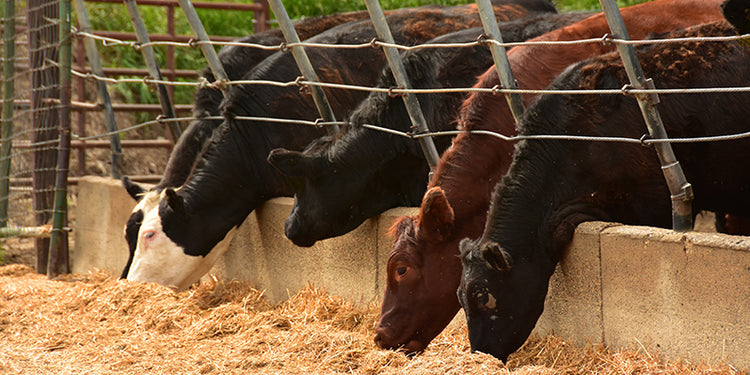Nutrient requirements of a ruminant will vary over the course of its lifetime, but regardless of producer goals, stage of production, or management, ruminants will always require these key nutrients:
 Order Now Contact a Representative
Order Now Contact a Representative
- Protein
- Energy
- Fiber
- Vitamins & minerals
Protein
Protein is a chain of nitrogenous compounds called amino acids. Protein supplementation helps in a number of processes including muscle deposition, frame and organ development, and increased fiber digestion.Energy
Energy comes in many forms, but the most commonly thought of is starch, as that found in corn. Energy is important in fat deposition and is deposited differently when fed at different points in life. For example, high energy diets fed from weaning through the growing period lead to more intramuscular fat development. More back fat accumulation occurs when high energy diets are fed later in life, through the finishing period.Fiber
Fiber is a structural molecule made up of cellulose, hemicellulose, and lignin, which are difficult to digest. When ruminants “chew their cud” they are chewing already partially digested feed to decrease particle size. This allows for more surface area, so the ruminal “bugs” are able to digest it more effectively. One of the important aspects of fiber in the ruminant diet is the roughage or “scratch factor” it provides. Fiber sources, such as hay, will scratch the rumen wall, which increases the surface area and growth of papillae along the rumen wall. The larger papillae are in number and size, the greater surface area there is to absorb nutrients.Vitamins & Minerals
Vitamins and minerals are vital for animal health, development, and reproduction. While found in all feed sources, requirements of essential vitamins and minerals are not usually met through the basal diet, and need to be provided through loose range mineral, mineral tubs, or through a supplement.Supplements & Additives
Additives such as mold inhibitors and binders can be applied to feed sources to help with feed quality through delivery and storage. Additional feed additives can be beneficial to animals, such as vitamins and minerals, medications, and natural supplements to increase efficiency and can be provided through feed, water, or blocks.Nutritional Balance
It is vital that all nutrients are balanced with one another, but a key player in growth and development is the balance between protein and energy. How much protein vs. energy the animal will need depends on a number of factors but is necessary for maximum growth and reaching full genetic potential. Think about it in terms of filling a barrel with water. All of the protein “boards” are one height, but the energy “boards” are cut short. It does not matter how much water you try to put into the barrel, the energy “boards” are preventing maximal water fill. In this example, water signifies potential growth and production limited by an imbalance in nutrients.How can AgriGro® help you achieve your goals?
NutriZyme® is an all-natural water and feed additive that enhances healthy gut microbes, therefore increasing digestion and efficiency. A healthy gut environment helps you get more out of the feed you provide and enhances the ability to reach proper balance among nutrients. The combination of vitamins, minerals, carbohydrates, and protein found in NutriZyme® improves overall health and vigor, weaning weights, fertility, and intake in cattle. To learn more about AgriGro®'s Livestock product line click here. Order Now Contact a Representative
Order Now Contact a Representative


